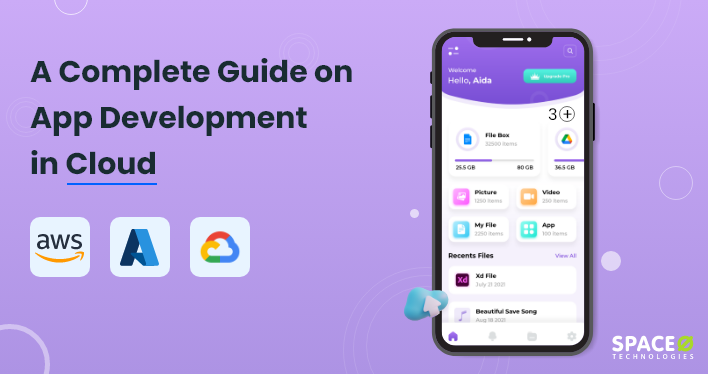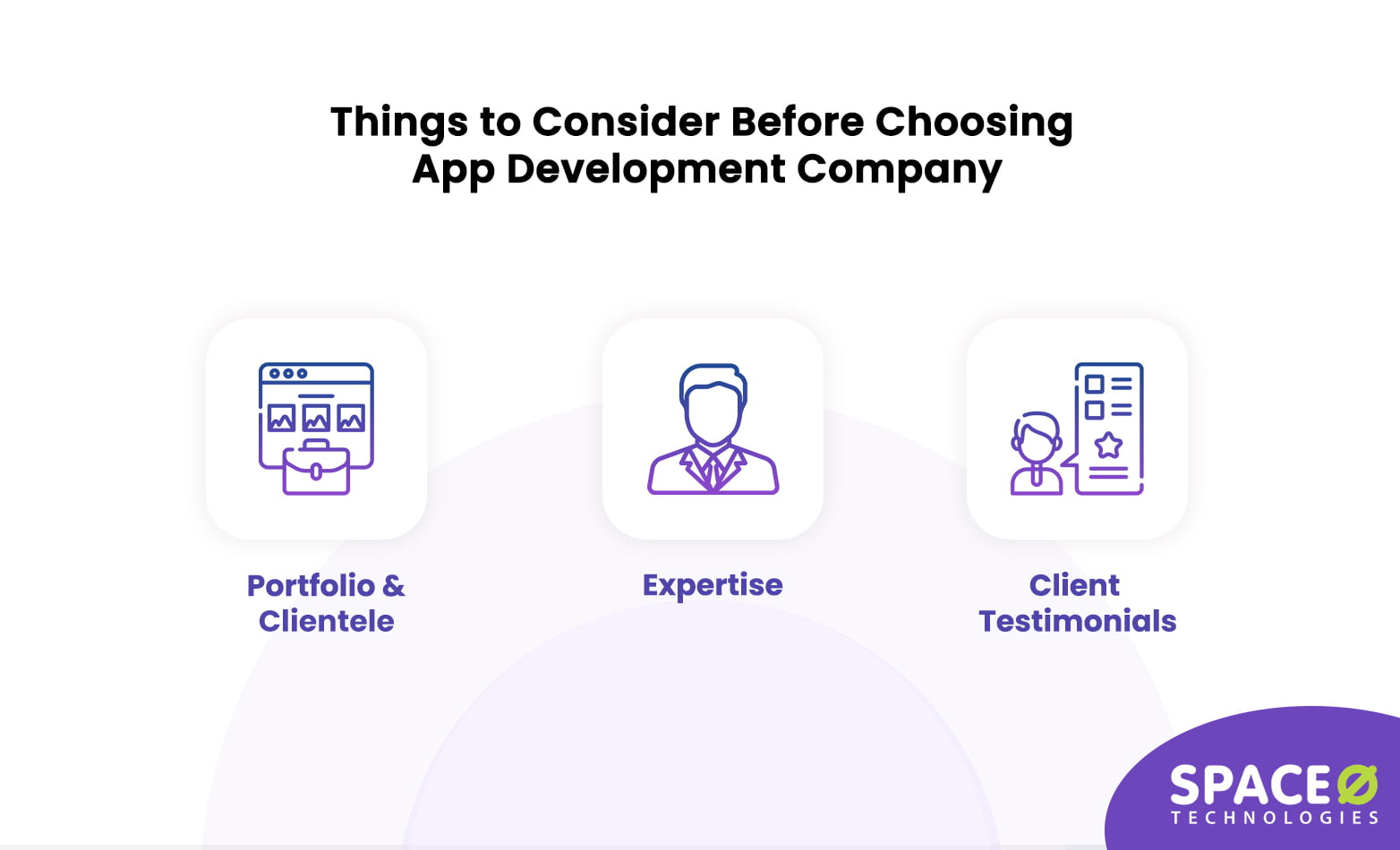Want to learn about application development using the cloud?
Accounting to Statista, over 60% of all corporate data is stored in the cloud. With the implementation of cloud computing services, the percentage share for storing cloud data is continuously increasing.
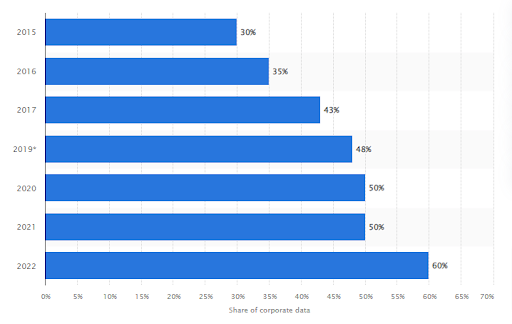
Source: Statista
Also, the cloud applications market size is expected to reach USD 168.6 billion by 2025. The data clearly shows that number of mobile apps that migrate cloud services is growing exponentially. That clearly proves to be beneficial for multiple businesses.
Therefore, if you have decided to build a unique cloud solution for your business, read this exclusive guide on application development in cloud. Being a top mobile app software development company, we have discussed the entire development process with our cloud app development professionals.
Based on their comments and our research, we have addressed the process, benefits, cost, and examples of a cloud-based application.
Table of Contents
- What is Cloud?
- What is a Cloud-based Application Development?
- How to Build Cloud-based Application from Scratch in 6 Steps
- Perform Market and Requirement Analysis to Understand Your Customers
- Choose App Features and Architecture According to Your Business Requirement
- Choosing the Right Tech Stack to Develop Highly Functional Mobile Apps
- Hire App Development Team to Develop Your Cloud App
- Start Your Mobile App Development Process
- Deploy Your Mobile App for Users
- How Much Does It Cost to Build a Cloud-based App?
- Types of Cloud-based Applications
- Benefits of a Cloud Application
- Challenges in Cloud-based Application Development
- Examples of Best Cloud-based Applications
- FAQ About Cloud Application Development
- Build Your Enterprise Solution With Cloud
What is Cloud?
The cloud is the service that you hire without having to own or manage the IT infrastructure in exchange for a subscription or recurring fee. Usually, cloud services are managed by third-party services. Dropbox, Salesforce, WebEx, and Cisco are some of the well-known examples of cloud.
You get cloud computing services that travel over the internet to servers located in different locations. Because of a fast and secure internet connection, it is now easier to leverage cloud services and use cloud-based apps.
The Cloud market size has increased to $525.60 billion in 2023. The metrics clearly show the consistent growth of Cloud metrics. Rather than streamlining the mobile app development process, entrepreneurs can focus more on the core purpose of the business.
Therefore, let’s quickly understand what actually a cloud app is and, later, how to develop a cloud app.
What is a Cloud-based Application Development?
To simply put forward, a cloud-based app is an app that uses cloud-based services.
Building a cloud-based app means you leverage cloud-based services, such as data storage, database, and servers. Additionally, these apps distribute the process logic and data storage on a device between the client-side and server-side.
Here are a few characteristics of a cloud-based app:
- Cloud lets you store the data on the application so that an app user can easily run the app in offline mode. The data will be automatically updated once the app is online again.
- Cloud-based apps are easy to be operated from anywhere, as you only need a good internet-connected device. All the data of the app is stored in the cloud, allowing you to access it from anywhere.
Want to Develop Cloud-based Solutions?
Space-O is a top cloud App development company in the USA with experience working with over 1200 clients worldwide. Talk to us.

After understanding the characteristics of cloud-based apps, now let’s check the 6-step-process of developing a cloud-based app for your business.
How to Build Cloud-based Application from Scratch in 6 Steps
Follow these step-by-step processes to create your own cloud-based application from scratch.
Perform Market and Requirement Analysis to Understand Your Customers
Before the actual app development process begins, you must identify the pain points of your target audience. This will help you get clarity on the valuable business solution you are offering them. Next, analyze the market requirements to understand what apps can be easily transferred to the cloud.
Also, pay attention to business goals and vision for the proper functioning of the app, such as app development timeline and cost. Moreover, you can research your competitors and check their strategies, offered services, and business model to form requirements. Enhance your idea to provide a unique cloud-based app solution that helps you attract your target audience.
Choose App Features and Architecture According to Your Business Requirement
In case you are done with the market research, you need to decide on the features you want to integrate into your app before hiring an app development agency. Thinking of the features, service model, application cloud migration, and architecture will also help you optimize the app development cloud computing process.
Choosing the Right Tech Stack to Develop Highly Functional Mobile Apps
When choosing tools and technologies for developing cloud-based applications, you must be ready with the app features, design, and requirements. The following table consists of a list of applications & data, utilities, DevOps, and business tools that will help you build a functioning mobile app for your business.
- Akamai
- Cloudant
- ClearDB
- Google Analytics
- Twilio
- Optimizely
- Heap
- Recurly
- Zuora
- Cyfe
- TransmogrifAI
- Jenkins
- Bitbucket
- New Relic
- Datadog
- Puppet Labs
- Cloud9 IDE
- Sauce Labs
- StillAlive
- Jira
- G Suite
- InVision
- Salesforce Sales Cloud
- Balsamiq
- DocuSign
- UXPin
Hire App Development Team to Develop Your Cloud App
To build successful cloud-based solutions, you need an experienced app development team. There are various methods that you can use to outsource your app development requirements.
Either you can hire freelance developers, hire an in-house team, or outsource your requirements to a professional and experienced cloud app development company, such as Space-O Technologies. Also, you can refer to the website portals like Clutch, Upwork, and Toptal to find a reliable technology partner.
While hiring a tech company, go through the portfolio section to check how many cloud solutions they have built, their expertise and offered services, and reviews & ratings of their past clients. Apart from that, check the following image to consider 3 key elements prior to choosing the app development company.

Also, consider the following points before you hire an app development company.
- Global presence and cloud app development team size
- Cloud app design and development standards
- NDA agreements
In fact, you can also hire Space-O to outsource your development requirements as we are one of the leading app development companies in the USA to build more than 4400 apps.
Additionally, Space-O is one of the best-rated companies on the portals like Clutch and Upwork. On Clutch, we have 4.8-star ratings, and on Upwork, we maintain a good rating of 96% of job success. We built many top solutions and helped our clients generate revenue and build brands for themselves.
Start Your Mobile App Development Process
Once you hire the best team for your project, the team will start building your application, considering your custom requirements and business challenges. The team will begin with the wireframing and prototyping process to help you define how the features of your will function. This will also help you estimate how long it takes to build an app from scratch.
Later the UX/UI team will prepare a user-friendly interface to define the users’ interaction with the system and how they can leverage the cloud services. Further, the developers start building a top-notch solution for your business requirements.
Generally, developers use scrum or agile methodologies to build a cloud-based application because the app development process is complex and time-taking.
Tip: There are multiple programming languages and tech stacks for developing mobile apps. The key to developing a successful mobile app is to select the programming language and tech stack which suits your app development requirement.Once the application is fully built, the QA team will perform various tests to ensure the app is running seamlessly and as expected on all the platforms and devices. Moreover, the team will check the app for performance, security, usability, and compatibility.
Deploy Your Mobile App for Users
The final stage in the app development is deploying your app on the app stores, such as Google Play Store or Apple App Store. Your app development team will deploy the app on the app stores keeping the app store guidelines in mind.
Please know that the app launching process may take some time, up to 48 hours to 7 days. However, to launch the app successfully and quickly, consider the following points:
- Make sure you follow the app store guidelines so that your app doesn’t get rejected
- Fill in all the required data, such as the name of the app, keywords, subscription cost, etc.
- The app is fully optimized and tested thoroughly
So far, you have learned the 6-step app development process. Now, it is essential that you know various types of cloud app development solutions which are available for enterprises.
One of our clients was facing challenges while managing his transportation business. The drivers from his company were not able to receive transport requests, optimize routes, and truck drivers. Therefore client wanted to build cloud based transportation management solution. We understood the complete requirement of the client and built a cloud-based solution. Check the following section to know complete information about One8.
| Aspect | Description |
|---|---|
| Architecture | Experienced tech professionals recommend using microservices architecture for cloud-based apps so that it lets you reduce the complexity of the system rearrangement. |
| Service Model | You have 3 options for selecting a service model, such as IaaS, PaaS, and SaaS, that will help you meet the unique needs of your business and will be easily scalable as those needs change. |
| Cloud Migration | For a functioning business, cloud migration helps to move a company’s data to the cloud server for easy accessibility and processing. |
After deciding on the features and architecture, you will be required to choose the tech stack for your cloud-based application development.
| Application & Data | Utilities | DevOps | Business Tools |
|---|---|---|---|
In case you find it challenging to decide on the tech stack for your unique cloud-based app development, get in touch with a leading mobile app development service provider.
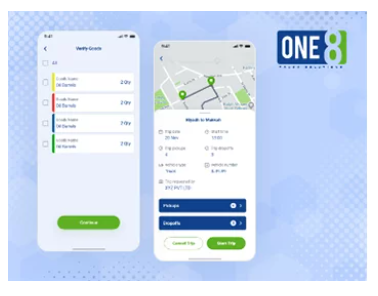
We developed a cloud-based transportation management solution for a logistics company. It is a comprehensive service that enables businesses to request transport, obtain an optimized route, and track drivers. Additionally, we created an Android app for the drivers that includes pickup, dropoff, and route information.
Also, you must be looking to find how much you actually need to invest in cloud-based applications. If so, then read the following, where we discussed the development cost for cloud applications.
How Much Does It Cost to Build a Cloud-based App?
Further, we have bifurcated mobile app development cost and price based on the app complexity.
Have a look:
| Complexity of the Cloud App | App Development Timeline | Approx App Development Cost |
|---|---|---|
| Simple Cloud Application | 100 – 250+ Hours | $10,000 – $25,000 |
| Medium Cloud Application | 250 – 600+ Hours | $25,000 – $80,000 |
| Complex Cloud Application | 800 – 1200+ Hours | $80,000 – $1,50,000 |
Please also note that the cloud hosting prices are not included in the above-mentioned cost ranges. You can choose hosting platforms like AWS, Microsoft Azure, or GCP to save on hosting costs.
Also, know that the cloud application development cost is influenced by these factors:
- Product design
- Product features
- Location of your outsourced development team
- Project size and complexity
- Usage of the third-party services
- Technology stack
Also, you can talk to our experienced consultant for mobile development and consulting to know the exact app development cost. Even, reach out to the cloud development service provider, keeping all your requirements and conditions in mind. The company will be able to help you validate your app idea and offer you an estimated app development cost as well as a timeline. Also, to learn more you can go through our guide on developing SaaS applications from scratch.
Types of Cloud-based Applications
In this section, we are going to discuss the three major types of development solutions that are available for enterprise companies.
Software as a Service (SaaS)
- Allows to manage CRM systems and database of the customers effectively
- Automates the signup process for services and products
- Offers email tools and auditing features
- Easy to share agendas and calendars with the team to plan future events
- Quick to manage documents for file sharing and collaboration
- AWS
- Salesforce
- Google Apps
- Zendesk
Product as a Service (PaaS)
- Operating systems
- Database running infrastructure
- Development tools
- Middleware
- Openshift
- Windows Azure
- Heroku
Infrastructure as a Service (IaaS)
- Detailed invoice
- Tracking
- Resiliency tools (backup recovery and replication)
- Log access
- Security instruments (PCI-DSS compliance, data encryption protocols)
- Load balancing
- Clustering
- Microsoft Azure
- Zoom
- PayPal
- Slack
SaaS means developing cloud-based applications used via mobile devices and web browsers. SaaS lets you access the app online without the need for configuring or installing the app on the devices. Google Workplace, Salesforce, and BigCommerce are some of the well-known examples of SaaS.
Features of Software as a Service
| Companies Invested in SaaS |
With PaaS, you leverage the resources and services on rent for developing cloud applications relying on cloud providers for infrastructure, mobile app development tools, and operating systems. In addition, cloud vendors offer software and hardware resources to make your cloud app development process easy for you.
Product as a Service can be used
| Common PaaS Cloud Platforms |
If you are choosing IaaS cloud services, then your entire business infrastructures, such as network, server, storage, and visualization, will be handled by the cloud provider quickly, including a public cloud or private cloud.
Cloud Infrastructure as a Service Offers
| Popular Cloud Applications Use IaaS: |
Do you want to how a cloud app can help you in your business? Check the advantages of having a cloud application.
Benefits of a Cloud Application
Having a cloud-based application and leveraging its benefits is not limited to only enterprise businesses. In fact, most businesses are now using cloud-based applications for data storage and taking care of processing issues by remote servers. Along with this, we are going to discuss the advantages of mobile apps to develop cloud apps for your business.
| The Benefits of Cloud Applications | Description |
|---|---|
| Cost Reduction | With the cloud, you only need to pay for the available resources and feature sets required for app development. This has a pay-as-you-go system for every cloud deployment service, helping you save a lot of money. |
| Security | You get full security with the cloud as the cloud host monitor data security round the clock. Also, you easily comply with government security standards when you use cloud services, which often provide automated responses to data recovery. For example, people use public cloud hosting like Dropbox or Google Drive to store their documents, which is completely safe. |
| Flexibility | You get more flexibility when using the cloud compared to hosting on a local server. Also, the cloud can easily meet your demands for extra bandwidth instead of updating the infrastructure. |
| Scalability | Cloud-based apps give you the required scalability even as your company expands by adjusting current business demands. This benefit of the cloud allows you to manage a large number of users, resulting in great profits. |
However, when you develop a cloud-based application, you might face these core challenges as well.
Challenges in Cloud-based Application Development
Being a cloud developer, you may face multiple challenges in mobile app development. Let’s discuss each challenge one by one.
| Challenge | Description |
|---|---|
| Service Design | For cloud application developers, it could be challenging to design flexible and reusable components as cloud apps need to be tightly coupled with service logic and implementations. |
| Interoperability | With the cloud, you might face challenges while writing code that works well with multiple cloud providers simultaneously. You need to follow standardized operating protocols, making them easy to implement. |
| Performance | You might need to use content delivery networks (CDN) like Google Cloud CDN or Microsoft Azure CDN to speed up content distribution and increase the page loading speed in cloud infrastructure. |
You have learned about the challenges of cloud-based app development. If you are planning to build a cloud app, you might be looking to know the app development cost. Connect with our app development consultants to know the complete info.
Want to Know the Estimate Cloud Application Development Cost?
Contact us with your requirements. Our tech professional will discuss your app development idea and help you with an estimated app development cost.
Now moving ahead, let’s quickly check some of the apps that leverage cloud services.
Examples of Best Cloud-based Applications
We have encountered many such applications which we use in our day-to-day lives use the cloud. Let’s discuss some of these apps.
| Apps | Description | Features |
|---|---|---|
 Miro | It is a virtual board where you can work with other users in a more creative and fun way. |
|
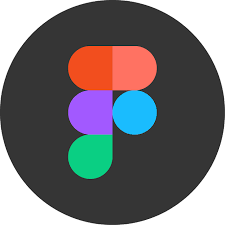 Figma | It is a cloud-based design app that lets designers create designs in a much more efficient way. |
|
 Dropbox | This app makes it easy for you to store your files in the cloud and make them accessible from any location. |
|
If you are looking for more answers on cloud-based application development, then check the following questions that are being asked the most.
FAQ About Cloud Application Development
What are the latest cloud computing trends?
The below-mentioned points are the latest cloud computing trends in cloud app development.
- Cloud AI
- Quantum Computing
- Kubernetes
- Containerization
- Intelligent SaaS
- Cloud Native applications
What are the points to consider before developing a cloud-based application?
Check the list of the following points prior to developing a cloud-based mobile app.
- Data security
- Architecture
- Cashing data
- Scalability
What are the different cloud service types?
Here are the 4 types of cloud services that you can avail of while developing your own cloud-based application.
- Private Cloud – It is used for only one company and can’t be accessed by others. It is a private web system for data, users, and apps.
- Public Cloud – Data stored in the public cloud can be accessed online by anyone. It offers optimal prices and flexibility with data processing.
- Hybrid Cloud – It is a combination of a public cloud and a private cloud. The companies can share data among on-device services and third-party apps with other components for deployment and optimization.
- Community Cloud – The community cloud works similarly to the private cloud. The only difference here is that you can share data between 2 or more organizations.
Build Your Enterprise Solution With Cloud
With this guide, you now have clarity on how cloud solutions offer a wide range of abilities to take your business to the next level. However, if you want to gain benefits in the long run, then you must think about developing a cloud-based application.
At Space-O Technologies, we have been building several cloud-based applications for various industries. If you have any confusion related to cloud-app development, contact our experienced cloud app developers to discuss your ideas and vision.
Once you contact us, our technical consultant will get in touch with you to discuss your queries. Also, with this, you unlock a free consultation of 30 minutes with our technical team.
